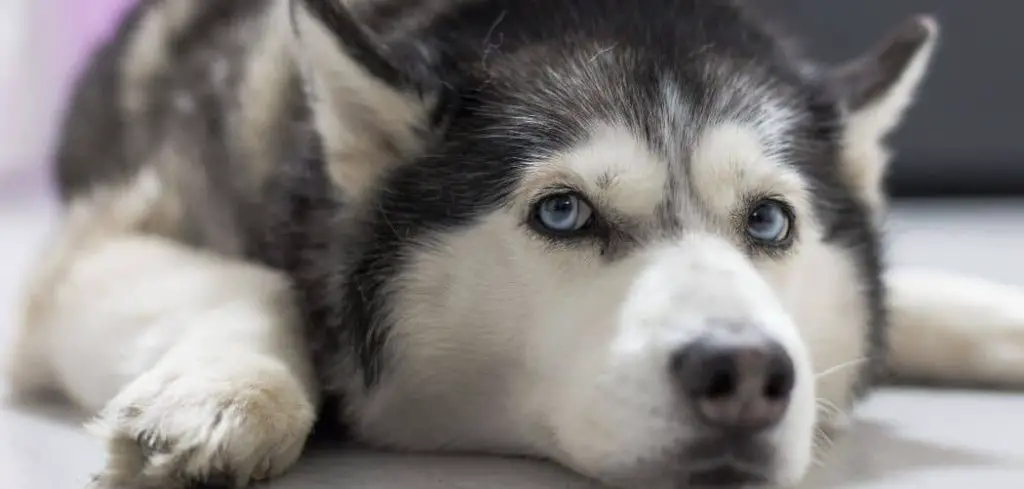It’s alarming when your old dog starts breathing heavily and won’t eat. These symptoms can signal discomfort, pain, or a deeper medical issue that needs prompt attention.
We outline the common causes of old dog breathing heavy and not eating, what you can do at home, and when to seek veterinary help.
Old Dog Breathing Heavy and Not Eating — Why It Happens
Heavy breathing and appetite loss in senior dogs often stem from issues affecting the lungs, heart, or internal organs.
Respiratory distress, heart disease, infections, pain, or even anxiety can all cause these symptoms to appear together. Older dogs are more fragile, so changes in breathing patterns combined with not eating can quickly become critical.

Common Causes of Old Dog Breathing Heavy and Not Eating
Congestive Heart Failure
As dogs age, the heart may lose its ability to pump efficiently, leading to fluid buildup in the lungs. This can make breathing labored and uncomfortable.
Your dog may pant excessively, cough, or seem restless at night. Loss of appetite often follows due to poor oxygenation and fatigue.
Without treatment, heart failure can progress quickly in senior dogs, making early detection vital.
Respiratory Infection or Pneumonia
Bacterial or viral infections can inflame the lungs and airways, leading to heavy breathing and general weakness.
Your dog might have nasal discharge, coughing, or fever. The effort required to breathe may make eating difficult.
Older dogs may not fight off infections as easily, and even a minor illness can escalate into a serious condition.
Read more: Old Dog diarrhea and Not Eating (Here’s what could be wrong)
Pain or Injury
Internal pain—whether from arthritis, trauma, or organ inflammation—can lead to shallow, rapid breathing.
If your dog is also not eating, they may be trying to avoid worsening the pain. You may notice signs like limping, whining, or being withdrawn.
In senior dogs, hidden pain can severely impact quality of life if left unaddressed.
Anxiety or Stress
Old dogs may become more sensitive to noise, separation, or changes in routine. These emotional stressors can cause panting, pacing, and refusal to eat.
Shaking, clinging to you, or hiding may also occur. While it may not be physical illness, chronic stress can weaken the immune system and worsen existing conditions.
Helping your dog feel secure can ease symptoms but ongoing anxiety needs attention.
Laryngeal Paralysis
This condition affects the muscles that control the larynx, making breathing noisy and difficult—especially in older large breeds.
You may hear loud panting, raspy breathing, or see your dog struggling after exercise or in warm weather. Not eating may result from the effort it takes to breathe or from associated discomfort.
Laryngeal paralysis can become an emergency if the airway is compromised.
Cancer
Tumors in the lungs, throat, or abdominal organs can affect breathing and appetite. Cancer may also cause systemic symptoms like lethargy, weight loss, and coughing.
These signs can be subtle at first but worsen over time. Early diagnosis allows for more treatment options and better comfort management.
What to Do If Your Dog Is Old, Breathing Heavy and Not Eating
Stay calm and provide a quiet, cool environment. Minimize stress and keep your dog indoors away from heat and activity.
Avoid forcing food, but offer small amounts of bland, soft food like boiled chicken and rice. If your dog refuses, remove the food and try again later.
Keep track of how often your dog pants, any coughing fits, or if breathing worsens when lying down. Note changes in gum color—pale or bluish gums may indicate low oxygen.
Use a fan or cool air to make breathing easier, but avoid placing your dog directly in front of cold air or heat.
Do not give human medications or over-the-counter drugs without veterinary approval.
When to Call or Visit Your Vet
You should contact your vet immediately if your old dog:
Is breathing with an open mouth continuously
Shows signs of blue or pale gums
Is coughing persistently or producing mucus
Collapses, seems confused, or is very lethargic
Has not eaten for more than 24 hours
Breathing changes in older dogs are never normal. When paired with loss of appetite, they indicate that your dog’s body is under stress or pain.
Your vet can perform X-rays, bloodwork, or heart scans to determine the cause and begin treatment.
Related Blogs
Read more: Old Dog Shivering and Not Eating (Is it pain, illness, or something else?)
Key Takeaway
If your old dog is breathing heavy and not eating, it could signal anything from stress to serious heart or lung conditions.
Don’t delay in assessing symptoms and seeking veterinary input—early diagnosis can lead to better outcomes and more comfortable days for your senior pup.
Comfort your dog, monitor their behavior closely, and trust your instincts if something doesn’t seem right.
